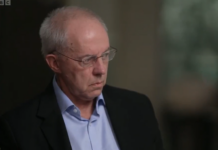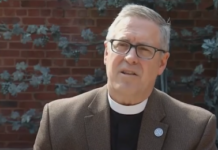Since October 2015 when the Archbishops’ Council announced that they had paid compensation to the woman given the pseudonym ‘Carol’, who alleged that she had been abused by Bishop George Bell, his defenders have criticised the Church authorities for never once affording the Bishop the presumption of innocence. Now, after the inquiries of Lord Carlile and Timothy Briden, it can be seen that the allegations against Bishop Bell were unfounded in fact.
THE CARLILE REVIEW
The Carlile report, whose conclusions (save as to publicity) the Church accepted, criticised the investigation of Carol’s allegations as a rush to judgment predicated on Bell’s guilt. It concluded that the decision to settle with Carol was indefensibly wrong and that the process completely ignored the Bishop’s reputation and the interests of his surviving family, including his very elderly niece.
The original statement by the Archbishops’ Council in October 2015 claimed that none of the expert independent reports had found reason to doubt Carol’s veracity. But Lord Carlile discovered that the only expert consulted by the Church thought it very likely that Carol’s experience of abuse in her first marriage had affected her recall, and that the possibility of false memories was a real one.
Regrettably Archbishop Welby added his authority to the destruction of Bell’s reputation: on Good Friday 2016, before the Carlile report was completed, he told BBC Radio that the investigation of Carol’s claim had been ‘very thorough’ and the finding of abuse correct on the balance of probabilities. We now know how far from the truth that was.
The Archbishop told Lord Carlile during his inquiry that if there had not been a proper investigation of Carol’s story, the Church would have to apologise. But sadly, when the Carlile report was published in December 2017, he chose not to do so. To the disappointment of Bell’s defenders, he appeared to reject the presumption of innocence; instead he commented that there was still ‘a significant cloud’ left over Bishop Bell’s name without giving any explanation of why he continued to hold that view in the face of Lord Carlile’s conclusions.
THE ‘FRESH INFORMATION’ AND THE BRIDEN PROCESS
The publicity given to the Carlile report appears to have triggered a copy-cat claim by the woman given the name Alison. The Core Safeguarding Group which had been responsible for the shambolic investigation of Carol’s claim now set about trying to substantiate that by Alison. They may well have hoped that the similar facts alleged by Alison would corroborate the discredited Carol. But within weeks the police, to whom the Core Group had reported the matter, closed their enquiries. Next an investigation by a senior retired police officer commissioned by the Church quickly showed that Alison’s evidence was unreliable and incapable of supporting any adverse finding against the Bishop.
Mr Briden reported that her account not only had internal inconsistencies but was also contaminated by her having read Carol’s story, a contamination revealed by her repeating verbatim some of Carol’s words which had been reported in the press. He ended his report by saying that all the allegations against George Bell remitted to him were unfounded.
Many will have hoped that on reading Mr Briden’s report Archbishop Welby would have publicly acknowledged that the cloud of which he had previously spoken had been dissipated. He did not do so.
THE DUTY OF THE CHURCH NOW
The history of the treatment by the Church of England of the reputation of George Bell has become a scandal. It is now the plain duty of the Church of England, nationally and in the Diocese of Chichester, to make amends by working to restore Bishop Bell’s reputation, not least in institutions which were once proud to adopt his name.
We welcome the decision of Canterbury Cathedral to revive a commission to create a statue of Bell and note the expression of ‘delight’ with which the Archbishop of Canterbury has responded. We acknowledge with gratitude the firmness with which the Dean and Chapter of Christ Church, Oxford have maintained and cherished the chapel there dedicated to Bell’s memory throughout the controversy. We note that the meeting room dedicated to Bishop Bell remains, as before, at the World Council of Churches in Geneva.
It is only in Chichester itself, the place in which Bishop Bell lived and worked for almost thirty years and where his ashes are interred in the cathedral, that any public adoption of his name is now suppressed.
We find the public stance of the Bishop of Chichester, Dr Martin Warner, incomprehensible and indefensible. The Bishop’s ‘Response’ to the Briden Report, published on 24 January 2019 and now promoted on the websites of the diocese and cathedral, only went as far as to acknowledge that ‘Bishop Bell cannot be proven guilty’. He added that it could not be ‘safely claimed that the original complainant [i.e. Carol] had been discredited’. This is a most regrettable insinuation that there was, or likely was, substance to Carol’s allegation and hence that Bell was to be suspected of abuse.
The Bishop emphasised the defamatory innuendo by asking ‘those who hold opposing views on this matter to recognise the strength of each other’s commitment to justice and compassion.’ There is, regrettably, no evidence in this response of the Bishop’s commitment to justice or of any compassion towards those who are wrongly accused. His words have been repeated verbatim by the Bishop at Lambeth in response to a Question at the recent session of the General Synod of the church. Indeed, the Bishop even invoked the authority of the House of Bishops in support of this view. So far as we are aware the House has never even discussed the matter.
Such words simply preserve the impression that there was, and remains, a case against Bell. A not dissimilar state of mind was revealed by the Chichester Diocesan Safeguarding Officer when he told the Child Abuse Inquiry in March 2018 that ‘all the indications we have would suggest that the simplest explanation for why someone comes forward to report abuse – because they were abused – is likely to be the correct one’.
As the High Court Judge Sir Richard Henriques has pointed out in his report to the Metropolitan Police on allegations against prominent individuals, such an assumption results in an investigation which does not challenge the complainant, tends to disbelieve the suspect and shifts onto the suspect the burden of proof, ignoring any presumption of innocence. It becomes a premise for a miscarriage of justice such as can now be seen to have been inflicted on the reputation of George Bell.
It should be sufficient to observe that like Professor Anthony Maden, Lord Carlile did interview this first complainant. We note Lord Carlile’s statement of 1 February 2019, made to the local campaigner Mr Richard Symonds: ‘The Church should now accept that my recommendations should be accepted in full, and that after due process, however delayed, George Bell should be declared by the Church to be innocent of the allegations made against him.’
We are more than conscious that this saga represents a wider pattern in the Church and across society where many other such miscarriages of justice have become notorious. Now it is surely essential that if all the many safeguarding bodies, national and diocesan, are to be retained by the Church of England their work must be placed under real legal discipline and in the hands of officers who observe fully the expectations and rule of law and act without fear or prejudice.
There must never again be any repetition of such a discreditable, indeed disgraceful, performance.
Andrew Chandler, Convenor of George Bell Group, 9 May 2019



